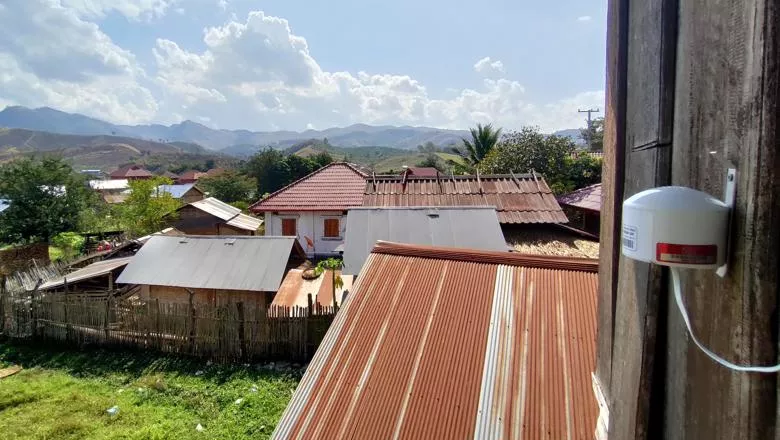King's researchers have installed a network of remote sensors in Upper Southeast Asia to collect ground-level data at the largest scale yet, on how landscape fires impact air quality.

Satellite data and global atmospheric models show that large-scale landscape fires in Southeast Asia lead to extremely poor air quality. Smoke generated from these wildfires has serious health impacts on local populations. Researchers in the Department of Geography have recently carried out work to install more than 80 Particulate Matter (PM) sensors in Laos, Vietnam and Thailand to measure ground-level air quality and validate satellite data.
Drs Mark Grosvenor and Hannah Nguyen are among a team led by Professor Martin Wooster, working with local partners to install the sensors that will measure particulate matter in rural areas known to experience much of the smoke from seasonal fires. Via connection to local 5G mobile networks, data measured by each sensor can be viewed and downloaded in real time from an online portal.
Findings already clearly show two daily spikes in the amount of smoke emitted into the air, when villagers light fires to cook their meals and for other everyday activities like burning trash.
Initial observations also indicate that the concentration of pollutants in the air in these regions is likely far higher than predicted by satellite-based model data.
From satellite data, we can model what we think the air quality might be like, but there's very little validation to know whether those models are any good or not. Our work has involved setting up a network of small sensors in these countries to collect ground validation data.– Dr Mark Grosvenor, Co-Investigator
The period from February to April is known as the 'fire season' when there is a sharp increase in fires in Northern Southeast Asia due to a mix of natural causes, such as very low rainfall, and human causes, such as fires lit to clear land for farming.
Dr Nguyen said: "Many of the farmers have a small plot of land and at the end of the farming season they burn stalks from the previous crop to clear the field for the next crop."
It would be very interesting to see the relative impact of agricultural burning on air quality compared to all the pollution emitted from everyday activities that go on throughout the year such as cooking with wood fires.– Dr Hannah Nguyen, Co-Investigator
It took three weeks to set up the sensors across the three countries – a challenge for the researchers considering the approaching fire season. They worked with partners on the ground to identify locations, place the sensors, and help navigate permissions and the administrative aspects of the work. The partners will also maintain the sensors and ensure they don't disconnect from the network or fail in other ways.
Although the project will conclude in March this year, the sensors will continue to collect and transmit air quality data. Once the collected data is validated, it will be made publicly available for other researchers, including those looking at the impact of the fires on the health of local populations. Health studies carried out at King's have already shown that globally, landscape fires are responsible for 1 in 10 deaths of children under the age of 5 in Less Economically Developed Countries (LEDCs).
This project was funded by a UK Research and Innovation Official Development Assistance (UKRI ODA) grant. This research is also supported by the Leverhulme Centre for Wildfires, Environment and Society, which Professor Wooster, Dr Grosvenor and Dr Nguyen are part of.
The partners involved are: Dr Chittana Phomplia (National University of Laos); Dr Quang Nguyen (Centre for Hydro-Meteorological Technology Application, Vietnam; Dr Veerachai Tanpipat, Upper ASEAN Wildland Fire Special Research Unit (WFSRU) and Kasetsart University (Thailand).






